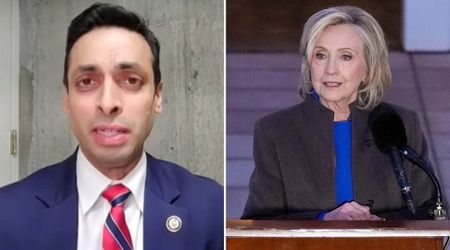FISA 702: Sen Mike Lee blasts FBI director Christopher Wray for monitoring Americans without a warrant

WASHINGTON, DC: In a dramatic confrontation at a Senate Judiciary Committee hearing on Tuesday, December 5, Senator Mike Lee, a Republican representing Utah, vehemently criticized FBI Director Christopher Wray for the agency's alleged spying on Americans without obtaining proper warrants.
Expansion of FISA Section 702
The controversy centers around the FBI's utilization of the Foreign Intelligence Surveillance Act (FISA) Section 702, a revelation that has sparked outrage since reports surfaced about extensive surveillance on hundreds of thousands of American citizens.
Originally intended for federal surveillance of communications involving foreign residents within the US, FISA Section 702 has undergone considerable expansion.
The FBI reportedly abused this authority by engaging in warrantless surveillance to gather information on individuals connected to significant events, including the 2020 George Floyd protests and the January 6, 2021, Capitol attack.
A recently declassified court ruling disclosed that FBI analysts improperly accessed the warrantless surveillance program on multiple occasions, leading to searches for information on Americans involved in civil unrest.
Despite the subsequent tightening of restrictions by the FBI, these revelations may intensify criticism of the program, particularly as the Biden administration seeks Congressional renewal, according to Fairfield Sun-Times.
Senator Lee, known for his staunch defense of constitutional principles, minced no words in expressing his displeasure during the hearing. "You have a lot of gall, sir. This is disgraceful," he told Wray. "The Fourth Amendment requires more than that, and you know it."
The controversy surrounding Section 702 grants the government the power to collect communications, without a warrant, from American companies like Google and AT&T when targeting foreigners abroad for intelligence purposes, even if they are communicating with or mentioning Americans.
However, the FBI has faced repeated accusations of non-compliance with limits set on accessing the intercepted communications database.
FISA Court's findings
The Foreign Intelligence Surveillance Court (FISA Court) has, on four separate occasions, found improper handling or access to Americans' communications. On three occasions, the court indicated that these actions violated the Fourth Amendment.
Senator Lee, in a stern rebuke, emphasized, "It's never different. You haven't changed, and you keep referring to these policies, these new procedures. We haven't seen that. We're not even allowed to have access to it, and we have absolutely no reason to trust you because you haven't behaved in a manner that's trustworthy."
During the hearing, Director Wray admitted that the FBI had ignored the requirement to obtain court orders for monitoring Americans, despite legal obligations in certain circumstances.
The Office of the Director of National Intelligence (ODNI) declassified FISA Court opinions in 2021, revealing a pattern of unauthorized monitoring of American citizens by the FBI.
Senator Lee pressed Wray on the potential abuse of Section 702 by FBI employees, questioning whether such actions should lead to the revocation of security clearance.
Wray acknowledged the possibility of discipline for abuse but expressed disagreement on what constitutes misuse of the program. Senator Lee continued his line of questioning, asking Wray about searches conducted by the agency on political figures and even a judge who had complained about the FBI.
Lack of transparency and trust
Wray, in response, pointed to new measures the agency has put in place to prevent abuses, stating, "We've implemented measures to address these concerns and prevent future abuses. We take these matters seriously and are committed to upholding the law."
However, Senator Lee pushed back, pointing out that lawmakers have not been given access to the details of these changes, highlighting a lack of trust in the FBI's conduct. “I’ve been on this committee for 13 years,” Lee said.
“During the entirety of those 13 years, I’ve expressed concerns to FBI Directors appointed by presidents of both political parties and three different presidential administrations. Every darn one of them has told me the same thing: ‘Don’t worry about it. We’ve got new procedures. It’s going to be different now.’ It’s never different," Lee added.

Senator Rick Scott, a Republican from Florida, joined the criticism in August, sending a letter to the FBI demanding accountability for the alleged abuses. Notably, the Section 702 provision is set to expire at the end of the year unless Congress reauthorizes it.
Despite Director Wray proposing changes, Senator Scott, echoing Senator Lee's sentiments, expressed dissatisfaction, stating that the proposed reforms lacked substantive details.
“In the face of these rampant abuses, it was disappointing that you are lobbying Congress to renew the Section 702 authorities without substantial reforms, and without public disclosure of accountability,” the letter said.
“If you agree with me that the hundreds of thousands of unlawful, warrantless searches of U.S. citizen information your agency has conducted under Section 702 are entirely unacceptable, to attempt to regain the American public’s trust, please explain the accountability for those rogue agents who conducted those illegal queries.”
Debate on reforms
The controversy has ignited a broader debate about the need for substantial reforms in the FISA Court. Elizabeth Goitein of the Brennan Center for Justice argued that, after a decade of trial and error, the court should have mandated the FBI to obtain warrants before searching for Americans' communications.
Goitein criticized the court's failure to address repeated government non-compliance with procedural requirements, emphasizing the necessity of a warrant requirement to prevent serious errors and abuse.
"After a decade of trial and error, the FISA Court should have required FBI agents to obtain warrants before searching for Americans’ communications. In my opinion, the court erred when it held that recent case law does not support a warrant requirement for U.S. person queries of Section 702 data," Goitein wrote.
She insisted that even if a warrant wasn't required by the case law, the court could have still concluded that "warrants were necessary here."
"In light of the repeated failure of the government, over the course of more than a decade, to adhere to the procedural requirements that the court has held the Fourth Amendment does require, the court could easily have determined that nothing short of a warrant requirement will guard against the 'risks of serious error and abuse' that have thus far rendered the government’s practices unconstitutional," she explained.
"Now that would have been a triumph of foreign intelligence surveillance oversight," Goitein added.










